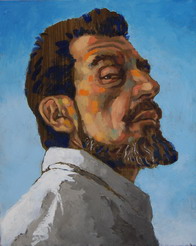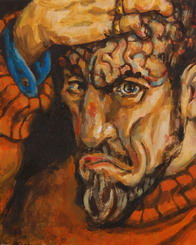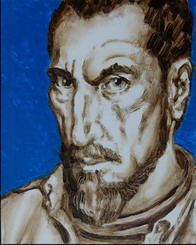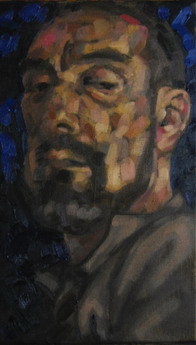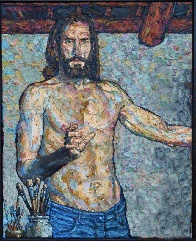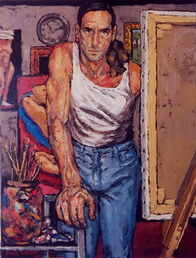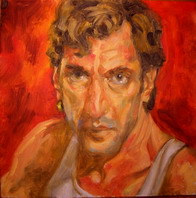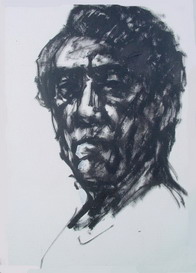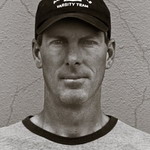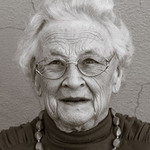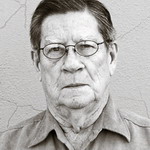| Paul's Mental Workshop, pg 9 of 9 |
|
|
|
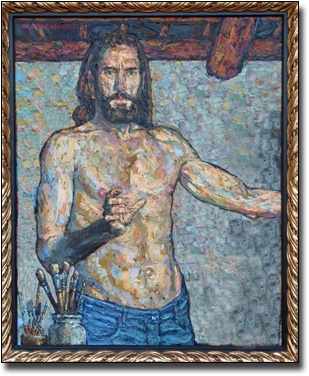 |
Death is more universal than life; everyone dies but not
everyone lives.
A. SACHS
When inspiration comes it should find you with a brush in your hand.
PABLO PICASSO
Art cannot be modern... art is primordially eternal.
EGON SHIELE
Art never expresses anything but itself.
Art is the most intense mode of individualism that the
world has ever known.
Both by OSCAR WILDE
Click here to try Paul's fun & challenging:
Art-Q
Quiz! pg1 - pg2 - pg3
|
page 9
Saturday, November 18, 2006 (270 words)
I'm back! I hated to neglect my blog so long but I've been
travelling & busy with other stuff. I'm only adding a short entry
today, something I think is funny & still on the theme of Thai
culture, but will be back soon with something more serious, promise!
I know a Dutch woman who has been all over the world because she
used to be a flight attendant, air hostess, stewardess or whatever it
is they are calling themselves these days. She surprised me by saying
she didn't like Thailand: "But why not? What's not to like?" I asked.
"Because they smile all the time but don't mean it." She answered.
Though a little startled by this point of view, I replied without
hesitation: "Well, I think it is better than Dutch people who don't
smile & do mean it."
I was only joking but of course there is truth in what she says, I
have seen Thai babies who can't talk yet or even walk but already know
how to wai & return a smile. When everybody smiles all the time you
can't expect that every time you see beautiful white Thai teeth it is a
genuine & sincere smile but in my opinion, the same smile to a
stranger that can easily get you into a fight in New York city, should
be much more likely to turn into a genuine friendly exchange than an
exchange with a stranger that begins without. Or put another
way—that even a smile motivated strictly by politness is more
likely to generate real smiles than none at all.
RBP said...
I have come across that comment many times from
foreigners in Thailand, that to smile too much is a sign of
insincerity. This seems to be more of a sad comment on our own culture
than on Thai culture, that to look unfriendly is more sincere than
looking friendly. In fact the misunderstanding arises because in our
culture the smile has only a narrow range of interpretation whereas in
Thailand the smile can mean many things including being pissed off, so
when they smile they do actually 'mean it'. Your
stewardess/hostess/flight attendant has fallen into the trap of many
'amateur' travellers (regardless of how many countries they have
visited- it's about attitude) of projecting their own values and
preconceptions onto others.
Paul Herman said...
Yes, your comments are right on the nail as usual. Though I was only
referring to smiles between strangers I recognise what you say is true.
My least favourite Thai smile is that of embarrassment & after
three years living here I still have trouble with
--for example-- "I hired you to fix my computer & instead you have broken it " Thai person: "smile..."!
Tuesday, November 21, 2006. (270 words)
A note in answer to some questions I received about the subject of
the article below: it started with a visit to the dark & dingy
Pakistan embassy in Bangkok to request a visa. It was early in the
morning & my flight left that afternoon, I first had to bribe the
fellow behind the desk to get the thing in time. I was then made to
wait a couple of hours though there was only one other applicant &
no visible work being done by the three or four employees. When I was
finally asked back to the desk the officious fellow
reached up without looking at me for the papers & passport I
proffered. Once in his hand & still without looking at me he said:
where's your such-and-such paper? I answered that I neither had nor
knew what the paper he asked for was.
He looked up at me for the first time & explained: "Why, the
paper from the company you work for that explains the purpose of your
visit."
"I don't have any such paper, I work for no company & my only
purpose for this trip is to see your beautiful country" I answered.
At first his mouth fell open like one of those antique, carnival
fortune-teller machines & then a slow laugh began to gurgle in his
throat & grew till he was slapping his knee in merriment. I stood
& waited until finally, he wiped the tears from his eyes &
directed his attention once more to the papers before him: "So I'll
just put 'for the purpose of tourism', shall I?"
Friday, July 21, 200 (1890 words)
Masculine versus feminine, Muslim versus
Buddhist.
Well, here I am again with the wild and wacky fundamentalist
Muslims. I have been living among the essentially feminine,
light-hearted and frivolous northern Thai Buddhists for almost
three years now and the differences are stark. Northern Thailand
joined the rest just three hundred years ago to form Siam, prior
to that it has its own long history and particular traditions. Up
until just one hundred and fifty years ago all men from the north
owed the king six months of every year in labour. The men went
off to be soldiers or whatever the king assigned them and the
women learned how to run things on their own in the men's
absence. When the men came home they found everything working and
took a (well-deserved) rest, this became a tradition that has
made the northern Thai man, even today, famously lazy while the
women are industrious.
In my town of Chiang Mai you will find most shops, restaurants
and offices run by women while the men abandon their children,
cheat, drink and gamble. When one walks down the street the women
meet one's eye and invariably return an honest smile.
Transvestites and homosexuals are folded easily into the social
mesh and the only prejudice they might be subject to, is being
liked more readily. Personally, I found it very easy to get used
to going to the post office, bank, or anywhere else, to be
greeted by an, often, beautiful man dressed beautifully as a
woman. Everywhere, everything is clean, service is eager and
everyone smiles easily, like I said: a feminine culture.
When I stepped off the thirty-six seat Fokker*(footnote)
in Peshawar, onto the cracked tarmac undulating in the afternoon heat,
my first impressions included the big, belligerent, grey-headed crows
familiar from years ago further south in India. Above their cackling
swoops though, wheeled far larger birds in still and flapless flight:
falcons. More falcons than I've ever seen together, falcons the colour
of the sun-dried brick that made the buildings, the colour of the earth
that filled the dusty air, the colour of the men who trod beneath them.
Upon walking to the airport building from the 'plane, I found the
people there were all men, all bearded, or at the
least—moustachioed, and all but the uniforms dressed in Shalwa
& Tupee. The Shalwa were mostly white with two other popular
colours—light blue or cream. In my entire five weeks there I
never saw another foreigner. In the street outside, the cars competed
with flat topped wooden wagons (in other words: a flat platform on
wheels) on which the men stand, reins in one hand, whip in the other.
They are pulled by skinny horses, tiny donkeys no larger than Great
Danes, cows, or pot bellied water buffalo all black-skinned and shiny
as if their hides had already been tanned.
When I reach my friend Zahir's house, I am greeted with Arabic
hospitality, the best in the world. Within minutes I have washed
the sweat off and am lounging like a Roman on the beautifully
carpeted floor of a cool room on a dripping hot day. We four or
five men lie in a rough circle, feet to head, left elbows propped
on pillows. The carpets are the colour of wine, the walls are a
rusty, sunset-orange marble with veins of blood red; the high
windows are coloured glass that bend warm light through the hash
smoke of our atmosphere. Big brawny men with big black or white
beards, one wears a Pakistani beanie (the tupee) another an
Afghan turban. They break the chewy, flat medallions of bread
with right hands only (the left being used for intimate hygiene
never touches food at a polite cloth) strong, veined, peasant
hands. They laugh easily, even childishly, but are fundamentally
serious; men who pray five times a day and mean it.
I try to remember Islam's table etiquette, never dip the same
bread twice in the communal dishes we share, wait until the head
of the household offers before helping yourself to the meat
dish... in my experience even in the simplest Muslim farmhouse,
everyone will notice your manners though they would never be so
discourteous as to show they don't like them. The mutton is as
soft as butter and redolent of a dozen herbs and spices. The
women billow in like shadows every once and awhile, to set the
cloth on the carpet, cover it in food, remove the detritus, bring
more courses, replace the teas (though the head of the household
does at least the first pouring, everyone helping themselves
after).
The women are dressed in pleated black tents that hang from the
only place they show a body shape: the top of their heads. The
only skin visible is their hennaed hands or if they wear a veil
instead, sometimes just one eye, the other covered by the veil
attached to the cloth at the forehead and obscuring the other
eye. Their hems are weighted against an honour-damaging breeze
and their sleeves are connected by a loop to their middle fingers
against any accidental revelation of the wrist.
I have never been introduced to my host's wife, for all I know
she may be bearded or be a different woman each time I visit.
None of the men there look at her or address her in any way, what
conceivable reason, after all, could a man have to speak to
another man's wife?
Lunch is followed by talk in five or six languages, broken
English and French added for my benefit, otherwise they all speak
Pashtoon, Arabic and Urdu and many speak Parsee or Turkish as
well. Talk is accompanied by a series of different and delicately
spiced teas along with dried or fresh fruits, nuts and olives. In
this pleasant atmosphere and good company I didn't notice the
time (in-fact at one point I asked the time only to discover that
not one of us wore a watch) until, without having shifted my
position, we were being served dinner.
Between lunch and dinner Zahir sent someone out at my bidding
to do two things, namely, put a local SIM card in my phone and to
fetch a tailor. The tailor measured me for a few Shalwas that he
brought back by lunch the following day (and I had to fight with
Zahir to pay for them). With my Shalwa shirt hanging to my knees,
baggy pantaloons with wide cuffs, lovely white-silk Tupee on my
head and the beard I’d been growing for some time (one
suffers an intangible but palpable diminution of respect if he
finds himself hairless among fiercely bearded Muslims)
and despite my light skin and green eyes I was, as often as not,
mistaken for a light skinned Kashmiri or as being of the tribe of
Afghans that are blonde and blue-eyed (the original aryans- from the shores of the Caspian sea), thus avoiding the
attention that I would otherwise be smothered with. Like most
countries the first question to the stranger is inevitably :
“Where are you from?” To which I usually shrug my
shoulders and answer: “I don’t know; I can’t
remember” which is much closer to the truth than mentioning
any of the places I have lived or the one I happened to be born
in (which I left in infancy) but still, it usually gets a laugh.
I remember the same results when bearded and caparisoned in a
beautiful Chilaba in Morocco, but though my few words of Arabic
and couple of hastily learned Pashtoon words (the first? Thank
you) couldn’t get me past a greeting and first interaction
without giving myself away—to 'Salam Aleykum' I answer: 'Aleykum
Salam', handshake and bring the hand to the heart with a slight
bow of the head. “Would you like tea/food?”
“Yes please” after that, anything they said to me
was likely to be incomprehensible and even when it was not I had
to answer in English or my painfully thin French.
But even then, once they realise I am European, my beard &
dress might mean I am Muslim which, in itself, is enough to erase
political borders and allow me in the club. It is this quality,
the clearly defined morality and behaviour that makes Muslim
societies so comfortable and, in a sense—noble in attitude.
Once back in Thailand the social pressure is so overwhelming that
I must shave my beard, to the Thai, a beard is just something that
holds sweat and dirt. To them Santa Claus, rather than evoking
feelings of huggability, is instead, thought of as a little
disgusting with his big dirty beard.
Many of the men in Peshawar walk around armed and I don't mean little pansy
pistols neatly holstered, but Kalashnakovs, and not strapped over
a shoulder but held in the hand, to all appearances ready at a
moment's notice. Once, when walking with Zahir past one of the
many shops with their hand-painted signs proclaiming their office
as: 'Arms Dealers' I asked: "What do you need to go in and buy a
gun?" He looked at me like I was daft and answered:
"Money...?"
Unlike Thailand, outside the home, everything is done by men,
shops, restaurants and offices are all staffed by men for every
task. Hence, everything is dirty and unkempt and service is
slovenly as well as inefficient. On the streets men jostle each
other to pass without ever saying "Excuse me" or "Sorry". The
streets are hard-packed earth running muddy where the sidewalks
should be. There are no public trash bins and everyone just
throws their refuse to the ground where they
stand. A minimal waste removal effort can be seen mostly in
the form of an occasional man pushing a wheel-barrow
overflowing but still being filled by him with the aid of two small
pieces of wood—one for scooping, the other for scooping on to.
As a consequence many of the town's streets and food markets
smell of putrefaction. It is the antithesis of Thailand, it is a
place that takes its socks off and throws them on the floor,
leaving them there until they become its cleanest pair, then
wears them again.
It is a masculine place and I must admit, despite everything, it
is nice, very nice, to be a man among men again.
For photos of the
Northwest frontier & Afghanistan, click here.
* This same little Fokker went down a few days after my arrival,
killing the 41 people on board. My return was on an old army
cargo plane (it looked, to me at least, of pre-jet-engine
design!) Just me and a few soldiers who were transporting some
equipment. The plane was minimalist on the inside with a few
cloth seats along its length, some hammocks
strung one above another and all the workings visible since there
was no covering on the inside, we looked at the inside of the
metal wall that made up its outside. Well, barely visible as the
only light came from a couple of port-hole windows placed too
high to see out of. No seat belts, no temperature control, no
emergency exits, just the platform that drops at the back and
allows men to push cargo up it. I tried to photograph the
aeroplane from the outside but the soldiers stopped me in no
uncertain terms, I did, however, sneak a couple of shots of the
inside, I will publish them when I get them developed. Back to footnote link
(Click here to see a photo of the
aeroplane)
posted by Paul Herman |
5:19 PM | 2 comments links to this post email this post to a friend
- RBP said...
-
Interesting your characterization of the two societies as
masculine or feminine but I think it is actually more complicated
than that. I have lived in both the societies and to me they are
both shaped by masculine considerations, the difference is more
in their relations to the feminine. Thai men in general have as
strong or stronger a macho outlook as anywhere and have set up a
society that is in many ways an ideal expression of this, they
also have a martial tradition as strong as any Muslim country
(Muay Thai is the fiercest and most effective fighting art on the
planet). However there is an intense awareness and appreciation
of the feminine and this adds the particular Thai texture to the
society that you have described.
- You will agree, I think, that much of what motivates us as men
is to make an impression on women and this often leads to some of
our finest moments (as well as some of our worst). Cultures such
as the one you have described from the North West Frontier
essentially attempt to make the feminine invisible or
inconsequential and therefore you have men that are only
interested in making an impression on each other, a kind of arrid
macho without the juice of sexual posturing. There is certainly
an appeal to this attitude (you mentoned the enjoyment of being a
man among men), it makes life so much less complicated but I
think it becomes sterile and unfeeling when taken to an extreme.
What can be seen in our own culture is an ongoing experiment in
social engineering that is shaping the women to be more masculine
with the inevitable consequence of making the men more feminine
resulting in some confusing paradigms.
- Paul Herman said...
-
Yes, you make some interesting & valid
points, the only one I will comment on though, is when you say:
'...to make the feminine invisible or inconsequential' In-fact, I
think it is at bottom, a simple expression of male insecurity
& the only way to ensure that the land is left to heirs that
are genuine genetic offspring of the man. In non-agricultural
societies, hunting/foraging or nomadic, it is not unusual to find
people are promiscuous as the land inheritance issue is
irrelevant.
-
TOP
Friday, July 21,
2006. (840 words)
Driving with Muslims or Buddhists.
When an American or European person first drives on Thailand's
streets it seems insane and impossibly dangerous. The majority of Thai
people on the road have purchased their driving licences illegally
without ever taking a class and such things as fast or slow lane, lanes
themselves, or even double yellow lines dividing oncoming traffic are
completely ignored. People drift from one lane to another, on any
two-lane road everybody drives in the fast lane and it is not unusual
to find people driving against the flow of traffic even on highways.
Mopeds carrying five people at once are common, all helmetless with
infants hanging on for dear life at the back or suffocating between the
adults -- the drivers themselves of any age old enough to reach the
pedals & handlebars at once. Red lights are optional, and are
generally taken as more of a suggestion to slow down and look both
ways. Since Thailand is a feminine and courteous society, however,
nobody beeps or gets angry when one driver does something that puts
another's safety at risk. If one wants, for instance, to pass the slow
moving car in the fast lane ahead, instead of beeping rudely, one moves
into the thousands of clueless buzzing motorbikes that drift all over
the slow lane and pass the slow moving car from the wrong side and
lane. This reflects the feminine attitude as shown by the nicest
compliment a Thai person offers another: 'He/she is greng
jai-- jai guang' generous and considerate to others.
Driving in some Muslim societies is equally insane and dangerous
but in a very different and masculine way. In the northwestern
frontier of Pakistan and across the border in Afghanistan
everyone beeps. When? At what? Well, all of the time and at
anything that moves: other drivers, chicken beside the road, bag
blowing across the road... now, you might think that aside from
the cacophony created by all the beeping, the effect for drivers
would be the same as no-one beeping, but no! The aggressive
Muslim in his strictly male world has taken this fact into
consideration and no matter how old and beat up his vehicle, he
has gone to the expense of installing a customised horn, each car
(like mobile phones) looks for his own sound and the only thing
they all have in common is decibel level. I even noticed mopeds
with simulated Mack truck horns.
At one point I was passenger in a van driven by someone I knew, a
friend of a friend, maybe fifty years old, big grey-white beard
but no moustache or hair on his head, dressed in shalwa and
driving me through Peshawar at night. We're going down a dirt
road with no sidewalks and bordered on either side with a market,
the road ahead and behind full of milling crowds. He drives
either with his high beams on or no lights at all. We are
ploughing through the crowds, beeping with desperate urgency,
bouncing through potholes and mud with near misses to all sides
when an exceptionally old man, frail and bent, sees us coming towards
him. The old man quickens his pace as much as he can but with
mincing steps hardly accelerates at all. Ahmed, the driver, is
looking with laser-like concentration but doesn't slow, I
unconsciously push back in my seat pumping the non-existent
brakes on my side. Now we are just inches from him, he still
hasn't cleared our path, we are going far too fast to brake in an
emergency, when... Ahmed swerves by the minimal amount necessary
to pass the old man just an inch or two on the other side of the
glass of my window... the old man throws a look of fear and
outrage back over his shoulder, his face lit like Boris Karloff
in our high beams. Ahmed turns to me and laughs with hearty,
boyish glee.
The agreed upon modus operandi on the road is that whenever there
is another vehicle visible you race to within inches of its rear
bumper or its side and beep insistently and incessantly. If you
catch the other driver off-guard or manage to intimidate him, you
race in front of him even if there is literally not enough room
for the volume of your vehicle but if the manoeuvre means a few
cars must screech or swerve to accommodate you, no-one is upset,
they will even give each other triumphant smiles as they pass and
then the car they just passed moves to within inches of his rear
bumper and beeps and swerves trying to overtake him in his
turn.
The Buddhist femininity (The Thai (Theravada) Buddha is depicted
as androgynous, symbolising the fact he was on a plane higher
than those where gender is relevant) expresses itself in
cooperation, where the manly Muslim competitiveness has at its
root the firmly ingrained attitude that if it is the appointed
hour of your death, nothing (like driving carefully) can save
you, and if it is not, than nothing can harm you.
For photos of the Northwest
frontier & Afghanistan, click here.
posted by Paul Herman | 2:45 PM | 0 comments links to this post email this post to a friend
Saturday, July 01,
2006
(300 words)
(click on thumbnails to go to
www.OxfordProject.com)
|
1984
|
Peter Feldstein moved to the tiny town of Oxford, (6-700 people)
Iowa, 32 years ago to teach photography at the State university.
In 1984 he set up his camera & took photographs of many of
the town's natives. In 2005 he did the same thing.
The resulting
project is garnering increasing amounts of attention with
articles in the NYTimes, television coverage & now, Peter
informs me: a book deal. Why is this project so universally
interesting? Well, I think the answer is obvious, it is a symbol
of our own lives encapsulated.
It brings to mind the last line of
that strange film: purportedly the true life of Chuck Barris the 1970's
game show host who invented the ' & 'Dating Game'. In the book the
film was based on, Mr Barris claimed his television persona was
really just a cover for his real job as CIA assasin. In the last
line of the film Mr Barris' character says, in a voice over,
(paraphrasing from memory): Hey! I have an idea for a new
television show: we get three old men on stage & give each of
them a loaded .38. We then talk of the dreams & aspirations
of their respective youths. The last one alive wins a
refrigerator!
The idea that most people's dashed dreams of glory
would cause them to commit sucide upon looking back, holds enough
truth in it to make it morbidly funny. The Oxford project offers
something of the opposite- people whose dream's smallness are
matched only by the tininess of their satisfactions or
disappointments. I'm not sure I can find any humour in it but it
is inarguably a fascinating look at the fellow humans whom I (as
socially marginalised artist) at least, never get an opportunity
to meet.
|
2005
|
 |
 |
 |
|
 |
|
 |
 |
 |
|
 |
 |
|
|
posted by Paul Herman | 2:48 PM | 6 comments
Paul,
Thanks for including our project on your blog. It's funny, but I
never thought of the dreams of my subjects as small. But clearly
it all depends on one's perspective. My guess is that survival in
a small town requires that. And the converse of that would be
that surviving in a large city would require larger dreams.
However, I don't think the successes and disappointments are any
smaller than anywhere else, again, from the point of view of the
individual.
Peter Feldstein
Paul Herman said...
I can see by your comments that my own
must sound condescending, & yes, I must admit, it is the
anthropologist in me rather than the humanitarian that responds
to your project. Of course the written copy that accompanies
each of the images is short & has been edited by your partner
Stephen, so it is both a mere glimpse into each person's psyche
as well as one that has been filtered.
However, I would like to point out the impression that it gives
from my perspective, & I hope I say nothing offensive as I do
realise these people are your neighbours, but the truth I would
like you to consider is that no-one who appreciates the art in
these photos, who buys them, who displays them, will be like the
people in the photos themselves.
Behind
the artful images themselves the project offers us the concept of
life in a nutshell & I think the people who will appreciate
them will do so for questions of pathos & poignancy more than
any sense of Rousseau-like nobility. Let's take Mike Hennes for
example. "I'm a foreman for the County secondary road crew. I
get up at a quarter to four, then I go online to read the local
news. On my way to work, I eat a Pop-Tart." I understand that
not having a routine of any sort makes me the odd man out but
still our introduction to Mike is extraordinarily mundane, with
the Pop-Tart forming the almost filmic touch that is practically
a symbol of the prosaic & banal.
He goes
on: "...My Dad retired from Amana Refrigeration. I've been at my
job for twenty-six years, from the day I graduated high school. "
Mike's father made a career of refrigerators; Sinclair Lewis
would be hard put to find a better symbol of mediocrity. Mike
himself has been at the same manual labour since before he became
a man. I don't mean to demean the labour itself but personally I
can't imagine still wanting what I did when I was eighteen; I
have lived several lives since then (I am forty-four) & it
seems to me Mike has hardly lived one.
He
follows this family history with: "I once had a job offer in
Missouri, but I got cold feet." Combine that with: "...&
three (children) from my previous marriage. My first wife &
I were high school sweet-hearts. We broke up after I found out
she was having an affair with someone she was working with.
Maybe I could have done something different. Maybe not. " It is
unclear what he means by doing something different, perhaps he
means if he had behaved differently his wife wouldn't have looked
elsewhere, or maybe that he should have tried to win her love
back, or maybe something else. But this is not the deep feeling
Henry Fonda in 'Grapes of Wrath' but rather a man who
seems adrift not only from choosing his own destiny but from his
own feelings, a man out of touch with his own
passions.
We
aren't told much about his eldest son & he may be just a
simple anti-social character who deserves nothing better than
jail but his father's statement: "My eldest son isn't doing much
these days, & that is a disappointment. He's been in jail a
couple of times. His purpose in life seems to be deer or
pheasant hunting." Makes me feel the son is questioning the way
of things, challenging authority, taking risks & finding his
own path. Like I said, that path may be no more than that of a
useless criminal but it might also mean that by searching &
fighting he forms his own moral infrastructure which, in my
opinion, will make it far stronger than one whose morality is
structured by unquestioningly following the rules. The man who
doesn't steal because he has learned that the pleasure in
ownership goes hand in hand with the pre-requisite labour; the
man who discovers this by failing to enjoy the ownership of
something he himself stole, has far greater conviction than the
one who never stole. The man who will fight for his honour is
the man that has seen that honour imperilled. The man who
questions authority in his youth is the one you can count on in a
crisis. The man who has floated with the tide & followed the
rules doesn't himself know if he will stand or run when it is
time to risk all.
I don't
know if I've made my point but I would like to add an experience
from my childhood to close: I remember when I was about thirteen,
an age when I, like many, was questioning who I was; sure I was
extraordinary but lacking experience, I had no supportive
evidence for my sense of superiority. At that age I believed my
potential to be inexhaustible & any choice I made was mine
for the taking. Without a father figure I decided I wanted to be
Clint Eastwood! Not the sensitive & intelligent man his
recent work in cinema has shown him to be, of course, but the
character he played so well in his youth, the strong, silent,
uber-cool Clint of the silver screen. It wasn't long before I
realised that I wasn't trying to imitate a person but a symbol of
a person caught in two hours of eventful & exciting
moments.
In a way the text that accompanies
the photos, the text that imbues the images with their respective
characters is merely a symbol & might even reflect Stephen's
frame of reference, better than the people pictured, but still,
it is the impression I come away with.
- 11:31 PM
-
- RBP said...
-
You may be wrong in your assumption that
peoples "dashed dreams of glory" would depress them when they
looked back on their lives, I think that the truth is that most
people have no such dreams. I think that they value a sense of
security more than adventure thus they limit their dreams to the
realm of the possible. The overall sense that I get is that these
peoples' lives turned out pretty much as they expected and when
it didn't it was usually because of something not of their own
volition. The fact is we can't all be iconoclasts because to
break taboos they must already be in existence and mediocrity
becomes so because it is the way of the majority. The thing that
struck me most about the project was how perfectly the
photographs represented the text making the writing almost
superfluous.
- 3:41
AM
-
Ivan said... (& Paul
responded in red)
I decided to contact you by email rather
than on your blog. Should you, on reading this, believe it
belongs there, feel free to post it. But in our previous blog
correspondence, and in the current debate, you might feel
you’re being subjected to some loss of face and, for
whatever reason, I like the qualities I see in you far too much
to voice public disagreement.
Please don't be so kind or considerate, I enjoy an
intelligent conversation with someone I disagree with much better
than a conversation with people who unthinkingly agree with me.
I do not feel you can make me lose face for two reasons: firstly-
I am familiar with my own opinions & can argue any one of
them with the reasoning I came to before the opinion, &
secondly- if your opinion/argument changes mine, convinces me I
was wrong, I will thank you for bringing me closer to the truth
instead of resenting you for showing me the faults in my
cognitive process or lack of relevant criteria...
Actually, on first reading your comments on
The Oxford project, I understood what you were saying completely.
At the same time I found myself uncomfortable and even a little
embarrassed because I felt sympathy with that view.
-
-
-
-
I understand, I suppose it can seem somewhat
snobbish but I am willing to dissect the thoughts in the belief
the aspect of snobbishness becomes irrelevant when the issue is
properly examined.
-
-
I wanted to respond, but didn’t know
how to give voice to this dichotomy and it was only by reading
the commentaries of the others that everything became clear. It
harkens, in a way, to our previous conversation about Drama
versus Doing. Most people just “do” their lives,
their chief goal being to accumulate some modicum of comfort
while they avoid pain.
-
-
Well said! In an existentialist universe the
difference in the attitude you describe & the understanding
of the universe Stephen Hawkins or Immanuel Kant might have,
becomes insignificant. Yet, to certain people, artists &
philosophers among them, finding a modicum of comfort while
avoiding pain seems a trifling & tawdry pursuit when compared
to placing a higher importance on creativity or truth than
comfort & abscence of pain.
Then there are the artists, the dramatists,
the authors, dancers, performers all, in a word, the creatives.
It’s both the pleasure and the pain of being creative that
allows us to add the element of Drama…indeed, to make
drama the all-important element. For without drama, who would
look at our paintings, view our films, read our books?
I would even argue that without the
fundamental drama (& desperate injustice!) of our own
mortality the arts would not exist.
Rembrandt painted burgermeisters, Vermeer
charladies, Van Goth mailmen. Tennessee Williams wrote about
Stanley and Blanche, the same sort of people as did Faulkner,
Hemingway, even Dostoevsky and Stendhal.
-
-
-
-
Yes, good point. Though each of your
examples, with the possible exception of Van Gogh who had no
opportunity, dealt as easily with other social strata. The Great
Russian writers, Dostoyevski, Gogol, Turgenev, Tolstoy (who was
himself a landed aristocrat & owned tens of thousands of
'souls' which is how the 19th century Russians counted serfs
& thereby the value of the land, even after 1861 when serfdom
was abolished) showed only humanism & depth of psychological
understanding, without prejudice, describing the thoughts &
motivations of aristocrats as easily as the mind of the simplest
farmer. In the end, real depth of understanding, must do away
with all prejudice.
-
-
-
-
Rembrandt may have used domestic staff or
anyone at hand for practice or as model when teaching, but he was
extremely interested in the prestige, society & luxury money
bought. He may have done several paintings of Saskia, the simple
house-maid he married, but only after having his first wife
locked up in a mental institution so that he would continue
to receive her pension. It does not take great men to make great
art, I was surprised to discover, for instance, that Ibsen (that
profound observer of human nature & the underlying drama of
life) was, in real life, a dandy who cared more for fashionable
clothes & society than the deeper questions. Indeed, I have
always been better attracted to Voltaire than Rousseau, I have
experience & doubt the existence of such a thing as
Rousseau's noble savage.
My last word would have to be a return to
a point I made earlier in this thread: in the end the ones who
appreciate all the great artists & thinkers you mention, are
not the lower class subjects of the painting or writing you refer
to but the aristocrats. Of course the definition of aristocrat
has changed since the end of the 19th century & people are
far more socially mobile (at least in the Occident) aristocracy
today is based, I think, much more on education than birth.
(Examples? Capote, Pollock (Jack the Dripper, one of very few
abstract artist whose work I find fascinating & valid)
or even Hemingway)
They give their very ordinary people drama
to create a story and to entertain an audience. Even your Henry
Fonda in Grapes of Wrath was just a dramatization. Paul, in
reality, he was simply another Okie trying to find work and feed
his family, much like the people in the Oxford project.
Quite right! I agree without reservation, though, I think, the
Rousseau-ish depth of feeling that make the dramatization a
classic, is a good example: it is not the appreciation by
'Okies' that make the film an enduring & moving testament of
human drama but by non-Oakies.
The psychologists say creative people tend
towards being bipolar.
Have you read Jamison's 'Touched with
Fire' (Depressive Illness and the Artistic
Temperament)?
-
-
It’s a tool we reach for in creating
drama, both in our art and often in our lives. Perhaps we think
we are the whole show, when we’re really no more than the
entertainment for ordinary folk.
-
-
In case my opinion is still not clear let me
re-cap- I disagree with the summation in your last sentence.
Though your 'ordinary folk' may be capable of genuine emotional,
or artistic reaction to Van Gogh, it takes a certain education to
understand Rembrandt or our greatest contemporary painter: Lucian
Freud. Ordinary folk (& I assume your definition (ordinary
people) does not refer to IQ or social class but rather an
ordinary level of mundanity, whose Latin root, mundus, means
'world' in other words: of the world, as opposed to higher
interests, id est- art & philosophy).
It is ordinary folks who insist
every person's opinion of the visual arts is valid, when in fact,
just like anything else (science or engineering, for example)
true appreciation is the result of an elitist pursuit, an
esoteric knowledge that implies the ambition necessary to learn
the language. I'm not sure I am explaining myself clearly &
will be interested in your retort but here is an experience you
might share with me that will illustrate the concept: Did you
study Shakespeare at school? Have you read Shakespeare on your
own? Notice the difference?
- Ivan said...
-
Paul,
Having gone back and forth with you on this subject several
times, I’ve arrived at an interesting conclusion. We really
are in total agreement. Else why would I read so much of your
arguments as confirming my own beliefs?
You write of the Russian writers living aristocratic lives.
Tennessee Williams, Capote, Hemingway, Faulkner, Mark Twain and
Tom Wolf today, relished playing dandies of sorts. Rembrandt,
indeed, is a marvelous example. Besides the examples you gave,
look at all his costumed self-portraits. Creative people live for
and by dramatizing lives, both their own and the protagonists
they write of. Even poor Vincent was guilty of dramatizing his
life, though in a less socially acceptable way. Come to think, in
today’s psychological era, Vincent becomes a hero. Recall
Don McLean’s melancholy salute, “Starry, starry
night”. Now I think I know what you tried to say to me, How
you suffered for your sanity, How you tried to set them free.
They would not listen, they're not listening still. Perhaps they
never will...
Look what being a drunkard did for Jackson Pollack.
Perhaps you’ll conclude our differences come under the
heading of Political Correctness. I hope not. What it comes down
to is this. In your first comment you expressed a kind of disdain
for those ordinary folk, or as you put it mundane people. But you
went a step further. You describe them as “fellow humans
whom I (as socially marginalized artist) at least, never get an
opportunity to meet.” The thing that most bothered me was
that you indeed see and meet such people every day. They are the
lovely people of Thailand who wait on you every day and who you
recently described so beautifully. The are also the Afghani
tailor and Pakistani drivers in your recent posting. You just
choose not to meet them on those term
Wednesday, June 28, 2006
(1130 words)
There are good arguments & there are bad arguments, there
are valid arguments & there are stupid arguments. The good or
valid arguments lead to deeper knowledge & harmonious
agreement, while the bad or stupid arguments lead to negative
emotions & deeper disagreement.
Plato claimed truth was in the air all around us, the proof being
that two men who are ignorant of a certain knowledge can, through
correct dialogue, pluck that knowledge from the very air... the
correct discourse referred to, defines all the terms used in
their arguments. It can be tedious at times but it is surprising
how much can be learned when defining to mutual satisfaction even
the simplest of commonly used terms; how little there is left to
'argue' about, & finally, how magically the insight sprouts
from barren ignorance.
In the orient, Confucius' ideas which became such a thoroughly
pervasive influence, fought the negative confrontational aspect
of argument with a strictly defined protocol in the allowed form
of response. In a word: manners. With manners that make it
impossible to cause one's opponent to 'lose face', all negatively
charged emotional exchange is channelled instead into
communication.
In the context of learning I think Socratic argument
beats Confucian for sheer efficiency.
Personally I think Hegelian dialectics (with its roots in the
pre-Socratic Greeks) where thesis & antithesis are reconciled in a
synthesis can make for interesting dialogue but finds mutual conclusion
with more difficulty; these & other thoughtful, reasonable,
approaches to argument, however, are generally ignored by most people,
indeed most arguments between friends & colleagues (not to mention
enemies), even those whose disagreement has nothing to do with their
cherished relationship, affect that relationship negatively. The reason
for this is not that most people like the person they argue with less
because of an opinion that is different to their own, but rather
because they don't know how to argue. It is this process that demeans
the friendship within which the argument plays out.
By arguing badly or stupidly, other considerations aside from the
difference of opinion being discussed enter into the feelings
they are being discussed with. Instead of being interested in
each other's point of view & continuing to exhibit the
respect each combatant has for the other (often a pre-requisite
to the eventual heat the argument generates, not the opinion)
they 'argue' through repetition & emphasis of their own
standpoint while repeating with ever-greater force that the
other person's perspective is wrong.
Personally, though I am not immune to the sting of pride: to the
'bad' feeling that something I believed in & argued for,
turns out to be wrong, but that petty feeling is overwhelmed by the
pleasure (when convinced by good argument that I am wrong) in
having a new & better truth to believe in & argue for.
Replacing the faulty truth with a new one means I won't be seen
as wrong again in the future, as a point of pride that alone is
reason to be grateful to the man who convinces me, through
argument, of a fallacious belief.
Professor Beebe, PhD in philosophy, explains the simple rules of
'good' argument:
An argument is= a set of statements that include
just two components-
a) A conclusion, which is the main point the argument is trying
to establish.
b) The premises, which are reasons given in support of the
conclusion.
There are two main requirements an argument must satisfy
if it is going to qualify as a good argument:
1) The premises must be true.
2) The premises must support the conclusion.
One must be careful here because though the statement is simple
the possible variations for the purposes of manipulating the
logic of the argument (in order to confuse & mislead) are
subtle & diverse. To start with it must be re-iterated
that,
1- though the list of premises may be true, the conclusion drawn
from them may not. (For various reasons we will examine)
2- though the list of premises may be false, the conclusion may
still be true.
Professor Beebe points out some common forms of fallacious
argument: (parenthetic examples & comments are mine)
A) Appeal to Inappropriate Authority = fallacy
committed when a conclusion in one area of human inquiry is
supported by appealing to the authority of someone whose
authority or expertise lies in an independent and unrelated area
of human inquiry.
B) False Dilemma = fallacy committed when:
(i) a decision is portrayed as being a choice between two (or
more) options;
(ii) all but one of the options presented is obviously bad;
but
(iii) there are, in fact, more options than are
represented.
(A man giving a speech to a gathering about zoning a section of
forest as protected habitat might say: Would you like to see this
beautiful forest turned into a strip mall & parking lot? He
hasn't said that it is the choice between his zoning suggestion
& a shopping centre but the people gathered might come away
with the impression that if they sign his petition they are
indeed choosing the better option of the two)
C) Straw Man = the fallacy of attacking a
position that one's opponent does not really hold and thinking
that one has thereby attacked the opponent's position.
(When used well the opponent in question can sometimes even be
induced to defend the irrelevant position thereby validating the
criticism.)
D) Slippery Slope = fallacy committed
when:
(i) someone argues against a certain proposal by claiming that it
will set off a chain reaction that will ultimately end in
disaster; but
(ii) there is no good reason to believe that such a chain
reaction will (or is likely to) occur.
(That because hard drug users generally smoke, or have smoked,
marijuana, smoking marijuana inevitably leads to hard drug use.
That because violence on television is desensitising, kids who
watch Popeye cartoons will exhibit violent behaviour)
E) Ad Hominem (latin- against the person) =
fallacy committed when someone erroneously attacks the person
giving an argument rather than the argument itself.
(A nutrition expert might have his statement about nutrition
attacked because he is overweight. The connection might seem
superficially accurate in an intuitive way, when in fact there
may be many reasons aside from ignorance of the subject that
causes him to be overweight. It might even be a reason the critic
does not recognise though logically he should be able to accept
it, such as that the nutrition expert feels he is more attractive
when overweight & works hard to keep from losing those
kilos.)
F) False Cause = fallacy committed when someone
concludes that one event is caused by another simply because the
one event follows the other.
(Every time I forget my umbrella it rains!)
Ivan said...
-
I certainly enjoyed this brilliant essay on How
to Argue. I might, however, debate only the last line. For me, it
never rains when I do carry my umbrella.
I appreciated your description of valid and stupid arguments. I
thought of a third category of argument I am often guilty of
engaging in, and wanted your opinion:
It is the argument we engage when we want to know the thoughts of
the person we're debating with better... really a form of play
where we try to expand on each others concepts.
Have you read a wonderful little book titled Finite and Infinite
Games, by James P Carse? It's subtitled A Vision of Life as Play
and Possibility. He describes a finite game as one that will end
when some one wins, while an infinite game is played without
rules, boundaries or even winners, so as to involve an
ever-expanding number of players.
I like that concept and thought perhaps, that is what you were
thinking when you started this delightful blog. Bravo
- 10:23 PM
Friday, June 23, 2006
On 'happiness', in answer to Ivan's
comment. (370 words)
Ivan wrote:
Happiness, in itself is a silly, giddy thing. Rather it's the
'pursuit' of happiness that's of value. Imagine a life engaged in
the pursuit of misery.
Ivan Sherman
Yes, I think that is a valid point Ivan, that a life in pursuit
of happiness can be defined as more successful than one that
becomes complacent upon accomplishing some pre-defined state of
happiness. I think a good analogy to the concept among artists
like you and I, is my belief that if an artist ever manages to
define his inner vision perfectly on his canvas, it becomes time
for him to do something other than paint. In other words: it is
the element of experimentation, of striving for the indefinable
aesthetic, that keeps an artist's work live. Making the opposite
true, i.e.- an artist who knows precisely what his painting will
look like before he begins produces- dead paintings.
Your idea reminds me of a quote by someone brilliant (who I can't
place in my memory to attribute properly) who said: "The only
true happiness a man may experience is in the contemplation of future
happiness." This is proven by the fact that whenever we do
achieve the object of our desire we immediately generate a new fantasy of
future happiness.
I don't however, agree with the last part of your statement,
"Imagine a life in the pursuit of misery" it might be difficult
for men such as you & I to imagine a life such as that, but I
think it is not so unusual for people to do just that, most, I
think, without realising it.
It is interesting and valid to define the terms of our dialogue
in this Socratic manner but I think nothing has been said about
the term 'happiness' that conflicts with my statement that a
successful life is not measured in quantity or even quality of
happiness but rather, in the more mature ability to appreciate
the drama offered by the range of emotional possibility our lives
present. I will close by offering another quote from my book
(Life is Good Even when it's Not) as an example: (when enough time
has passed)- "...I know when I look back, that I cherish the
memory of a broken heart alongside the joy I remember at seducing
the woman who broke it. Both are examples of living deeply. It is
about drama."
Thursday, June 22, 2006
(250 words)
In response to some of the
comments posted to the essay - 'Happiness Versus Suffering'
(below) I would like to offer this excerpt from my book: 'Life is
Good Even When it's Not':
The idea of life as a project or series of projects may not be
unusual, but the deeper significance is interesting: it has made
my satisfaction with life tied largely to my level of
productivity, rather than my volume of happiness.
Looking at a painting I did sometime in the past, I realized I
couldn't remember how I felt when I painted it. Or perhaps I
worked on the same painting--one day happy, the next, angry, and
a third, melancholy--and all that was left of those moments was
the painting. This made the painting of greater importance than
how I felt, and I eventually developed the theory (or made the
discovery) that the phrase, "man's inalienable right to the
pursuit of happiness" in the U.S. Constitution, constitutes a
basic flaw in cultural philosophy: a successful life cannot be
measured according to the amount or even degree of happiness,
but rather by appreciating the drama provided by the
range of our emotional life.
The fact that it is possible to be miserable one's whole life
does not change the fact it is impossible to always be happy. It
probably has something to do with what Chekhov said about
happiness being a thing defined in a subtle range of greys--no
single one concrete, the same thing that makes you happy today
(like someone's company) can make you sad or angry
tomorrow--while unhappiness is easily defined in its negative
quality as the absence of happiness.
Tuesday, June 13, 2006
The birth of Chiang Mai. (450 words)
To the Thai, a city is a living body that can get sad, angry,
happy, bored, sick... it is a cooperation of its inhabitants akin
to the collaboration of cells in a human body. After the kings of
Lampun and Phayao came to the aid of Mangrai, the king of
Chiang Rai to repel the invading Burmese, the three kings from
Chiang Rai in the north, Phayao to the south, and Lampun in the
east, decided to band together. They looked for a site between
their kingdoms to build the Capitol of their new country.
The three kings were strong idealistic young men, each sovereign
to kingdoms already old enough for pride in their traditions, in
Lampun originated the beautiful celadon ceramics of delicate
translucent green glazes whose roots are in China. Sukothai
represents much of Thai culture known to the West, the folk
dances, apparel and most importantly, the enamelled gold and
incredibly intricate linked chain jewellery they still make
today, while Chiang Rai makes beautiful
women.
The Kings met bare-chested and gold crowned, along with their
parasol wielding, fan waving entourages, in the verdant and
fecund valley which is now the Rose of the North: Chiang Mai. At
300 metres above sea level it was cool and had water tumbling
from the surrounding mountains into the Mae Ping, or Ping river.
Here they agreed would be a sublime city representing a perfect
friendship and the first unification of northern Thailand. They
designed a the town within a square moat a little over one
kilometre to a side with four fortified entrances each half-way
between two corners. If a city is a living body, however, it must
be conceived instead of simply built, and so, along with their
soothsayers, the auspicious date was decided and on the 8th day
of the waxing moon, the month of Visakha, the year of the monkey,
or April 24 1296, at exactly four a.m. Chiang Mai was born.
At the northern wall its head, whose opening was called the White
Elephant gate, a lucky symbol, through which good things like a
visiting sovereign or a celebratory parade might enter the city.
The southern entrance is the other end of the body out of which
the bad like the dead, the exiled and the sewage are expelled. At
this southern point also is the prison, while to the east, where
the river runs outside the walls, the rising sun lights the mind
with schools and library. To the west: workshops for jewellery,
arms, furniture. All around the outside of the moat the rice
paddies and finally, at its centre, its navel, spiritual and
physical health, temples and grain storage.
- Patcharapon
Kanchanapongpaisal said...
-
I live in Thailand and I found your story of
Chiang Mai's birth lovely! What you didn't mention, for the
benefit of those unfamiliar, is that our lunar calendar is now in
the year 2549 of our Lord Buddha, I have found most foreigners
are unaware and surprised by the fact we live in a different year
to them!
11:53 AM
Sunday, June 11, 2006
War Story (1400 words) (removed)
(410 words)
Christians are always talking about suffering & in the
foremost Christian countries the whole religion has become a cult
to suffering with the virgin mother as its centre (the Dolorosa)
but all the saints are either crying or bleeding or at the very
least in an anguished pose of ecstatic revelation (pain/pleasure
of physical climax). Even the priest's celibacy is seen as
sacrifice. The 33 years of life of the Christ himself, where he
taught with surprising success, is portrayed in churches mostly
through the 12 hours of the Passion & final crucifixion. The
religion's symbol might have been a Jesus standing in the act of
teaching, or perhaps forgiveness (arguably the main ideological
difference introduced by his teachings to those of the old testament) but
the church chose, & people worship instead, his mutilated
body dying on a cross.
As men imagine the thorns thrust into their own scalps or nails
into their feet, or the humiliation of the scourging in the
street as reward for doing/being good, they can empathise &
therefore worship Him for that sacrifice... that willingness to
suffer instead of doing what most are taught to do, are taught is
right: the pursuit of happiness & evasion of suffering. In
the United States it is even written into the political
infrastructure for Christ's sake!
But in-fact all religions deal with this question of suffering
first, & then the three big questions (where do we come from?
Why are we here? Where are we destined?). In the Orient
(beginning even in ancient Greece with the slave-philosopher
Epictectus) they say: Want nothing & you will want for
nothing, id est: avoid suffering. In the occident they say: life
is suffering, but if you accept it you will get a reward after,
like my mother used to say on my frequent childhood visits to
doctors & dentists- if you don't cry I'll give you an ice
cream after... the former denies passion, the latter, ecstasy,
neither is satisfying, truthful or in tandem with human
nature.
Now consider this: perhaps it is happiness & not suffering
that is life's bane. Exactly like opium which turns life into a
satisfyingly sweet dream just as it sucks one's vitality &
passion. Maybe Happiness is the part of life we can barely stand
& it is only the balm of suffering that relieves us of its
burden. Perhaps without suffering we would be crushed by the
weight of happiness.
- Ivan said...
-
The way we create substance, when faced with a
blank canvas, is to begin blocking in darks. In this act we begin
to learn there is light, even within the dark.
This is probably the real joy behind making art, whether visual,
or verbal. We create something where there was nothing and in the
process celebrate contrasts. It's akin to being a God.
12:19 AM
Saturday, June 10, 2006
Cogitations upon observing the life of an
ant,
from its birth to its death by old age,
while I lay in a
bathtub. (1530 words)
Without being too scientifically punctilious we all know ants
come in what can essentially be described as three sexes, the
only female of a colony is the Queen ant, she mates once, storing
the sperm for her entire lifetime in her own bloated body. She is
doted on by worker ants that make it possible for her to dedicate
her remarkably long life to egg production, fertilizing each with
the stored sperm. In some species she might run this egg factory
for dozens of years before dying, in the world of arthropods: an
age, an epoch, a very long time indeed. The workers make the
second sex of three; they are in-fact, sexless, incapable of sex
since, like bees, evolution has turned their originally female
genitalia to other purposes. They also can have very long lives,
six, seven even eight years, though their life style often means
they are squashed or eaten long before reaching old age. The
third sex, of course, is the male—the example of the species I
happened to be watching as I lay in the hot water of my tub. He flew
out with apparent joy along with thousands of his brothers to
hurriedly mate while flying frantically around any light source,
its instincts telling it the artificial light must be the moon
since up until recently the moon was the only light there was at night
time. Whether or not their lives culminate in the climax of
injecting their sperm into the queen, within thirty minutes of
being born, their four wings fall off & their bodies shut
down. Everywhere outside of my house the ground sparkles with discarded wings for days surrounding the ritual.
The feelings my observations anthropomorphically instigated were
that, emerging from the pupal stage with wings & immediately
aiming directly at the moon was a joyous moment. But when I
considered a little further I recognised the impossibility of the
sense of joy in an ant brain when in fact, they don't even have a
brain, & must make do with a rudimentary bundle of nerves
which allow them very little experience or sensation. I began to
think about it & came to the conclusion that their design
really only allowed two activities. They needn't feed themselves
as the energy necessary for their short lives has been given them
by workers since they were legless, sense-less larva. They don't
have any means of defence & appear in-fact, at least to
casual observation, to not even have the sense or capacity to try
& evade their predators. So what
are they capable of? Well,
of moving from one place to another, locating the female &
mating with her, nothing more. Despite the honour of having sex
with the queen, it seems, in my judgement, a rather dull &
uninspired existence.
But then I considered still further my summary appraisal &
asked myself which quality was it exactly that allowed me this
opinion of the male ant's life when compared to my own? What was
the actual substance of the difference between the two versions
of the experience we shared, the one we define as life? It is
obvious to me that despite the importance that ant might have had
to the hive, had he actually managed to find his queen circling
another light source outside of my bathroom. Or even to the gecko
that might have fed on him, why was his life insignificant while
mine wasn't? Was it a question of longevity? Does the fact I may
live seventy years compared to his thirty minutes define the
difference between us? Well, though thirty minutes is a tiny
multiple of seventy years, when viewed within the big picture,
the age of our planet for instance, or even just the age of our
species, the difference in longevity pales.
In this context one might even consider the fact that there are
many more species of ants alone within their genera, than there
are animals within the class of mammals, & most of them have
been around much longer.
If we are to include longevity as a measure of significance, than
what of the lichen that lives thousands of years without another
living thing in sight of its frozen habitat, finding sustenance
quite literally in the chemicals extracted from rocks. As
successful at aging as lichen may be there seems, at least
to the human mind, a complete, absolute & unmitigated lack of
purpose & therefore significance to its life, & yet it
seems to want to BE with a will at least equal to our own.
What's more, since physics has proven that time as a constant is
a human concept with no real meaning outside of human perception,
maybe that male ant experienced a human second as equivalent to
what it takes a human a year to experience. In fact, when I stop
to think about it, time is not even a human concept as I
described it above, but rather a human invention, the proof being
that without calendars & clocks to tick away the time in a
constant manner, man would have no way of knowing how long a day
was or how long he had lived. A cave dweller, who spends a hungry
day stalking an animal to kill & eat, would later recall that
day as much longer than the one that followed when he lay in the
shade of a tree digesting it.
So if that difference, a blink of an eye in geological time, is
negligible, what else might it be? Might it be the difference in
intelligence? Well, if level of intelligence is a possible
explanation for the difference in significance between the life
of a male ant & my own life I suppose I would have to examine
the purposes & uses of intelligence.
One example of the consummately astonishing results of human
intelligence is that billions of people around the world, every second
of every day, (with the tiny exception of a few hundred) decide to stop
the ton of metal they are conducting at lethal speeds instead of
smashing them into one another, simply because of a flashing red or
green light. But then ants, which some say make up as much as 25% of
the macro-animal bio-mass of the world (E. O. Wilson has estimated that
there are 10,000 trillion individual ants alive at any given moment),
sometimes live in colonies of millions of individuals with supremely
intricate cooperation & they not only possess no intelligence as
defined by humans but they do not even have brains... hmmnn... ok,
shelter, weapons, care of the young, herding other species as food
source, storing food for the future & a hundred other examples of
human intelligence are equalled if not excelled by ant societies, but
there is one aspect of intelligence that we beat them at: the
consciousness we exist. In fact our intelligence in that context is so
sophisticated we are even capable of believing we don't exist.
The first thing to consider when examining this concept is the
obvious one that though each individual ant seems no more than a
chemically programmed automaton, perhaps the ant colony is
actually a highly couth & mature intelligence made up of
unthinking individuals just as humans are made up of unthinking
cells that don't know they form part of us. Indeed, the ant
colony as a whole may be so far advanced in its intelligence
& self-awareness that it cannot conceive of a manner
functional enough in its crudity to communicate with us poor
individual humans.
Putting aside the theoretical possibility of that supposition,
the entire history of recorded human philosophy (& I refuse
to give theology more respect or credence than this single
parenthetic mention) consider human self-consciousness an
indication of a higher level of evolution than any other living
being, since we don't recognise it in any but our own species.
This could be it! This might be the proof there is indeed some
significance to my life that the ant, whose entire life I
witnessed, lacked. How exciting! But we would have to define the
purpose of life to prove or disprove whether self-awareness
qualifies as a significant factor.
Proof is a far rarer thing in philosophy than is a disproof, a
refutation. But I would argue thusly: if all of the estimated
30,000,000 living things on this planet have only one thing in
common; without any exception, not one single other quality that
all life shares, mustn't that be the most likely purpose of
'life' in the abstract?
As it happens there is one easily defined characteristic:
reproduction, or when examined more closely, replication. If we
can agree on that then the whole enigma quickly unravels to a
simple & obvious solution, ergo—the life form of greatest
objective significance is the one that is most successful at
replication. The intelligence & self-awareness, that made me
capable of the thoughts & ideas I have just written down, or
that allowed you to read & understand them, are simply &
entirely irrelevant. The list of most evolved 'life' would be
topped by bacteria, followed quite a ways further down by ants
& somewhere well below them by me lying in my bathtub
considering it all.
- Ivan said...
-
I think. Therefore, I think I am.
8:28 PM
- Paul
Herman said...
-
In fact your version of Descarte's maxim could
be said to be more accurate. The philosophical criticism of the
original statement being that the first 'I' of the statement
presupposes the self's existence, but then I was told by a
Frenchman that in the original French this is not true, that the
first 'I' is more akin to 'it'...?
- 10:47 AM
- Paul
Herman said...
-
The original statement by Descartes in French
is: "Je pense, donc je suis", which occurs in his Discourse on
Method (1637). Which, in fact translates exactly to the English:
I think therefore I am. In Latin: Cogito ergo sum, translates to:
"I am thinking, therefore I exist", neither of which deal with
the objection that the statement is fallacious due to the initial
'I' presupposing the existence of self.
page 9
Links to post titles:
P'sMW- page 1
California, first impressions
India
Conspiracy theories
I love you; thanks’; you’re welcome
Errata
Fear
Egon & the other animals
A note about price:size ratio in paintings
Strange tales
P'sMW- page 2
Christ’s devil
Timelines
Life's funnel
Souvenirs
Moon Myth
How chaos was subdued in the Japanese genesis myth
Noah Lukeman & the murky world of today’s book publishing
Morality and religion
Music and Love
Temeris Mortis
The Dream
Peace
God's Tick
Old Man (short story)
Intuition
A Curious Fact
P'sMW- page 3
Why Humans prefer other Humans to be like themselves
A letter to painters
Why do people talk?
The Painter's Eye
I'bn al Alhí's treasure (short story)
Associative Personality Disorder
Love poems, death poems
The Golem
Elitism in Art
Theory of the Mind
Death Scenes
Politics II
Rock & Roll
Words II- more words
Words
P'MW- page 4
Confidence
How to steal from gullible artists
Priests behaving badly
How to make a painting
Oats & history
A note about signatures on paintings
Bob Dylan
Number of atheists among scientists
Theoretical physics & me
Faust & Mephistopheles
Children's reading habits
How to get good photos of firework
The 20th century
Further Dialogue on the 20th Century article (here) with comments by Bobby Porter
Love is
Civilisation
Martial Art as Sport
Blind Boy Fuller
Becoming an artist
Insomniac notes
Mind-brain
Age
José Tomás
Black Adder
This is not a Blog
P'sMW- page 5
Dammit! (final comments on the article Karma without metaphysics)
Laic morality (comments on Karma without Metaphysics)
Karma without metaphysics
Chivalric ethics
Shibumi
Shibumi: Comments by Bobby Porter
Oxford Project revisited
How to travel
How Wang-Fô was saved
Fish memory
The artist’s relationship to his work
Bobby's response to The artist’s relationship to his work
Egon
20,000+
Memories of my father II
P'sMW- page 6
Men & Women
Girls: come closer & I'll tell you a secret about men
Catholic Spain
Art is
Bad luck
Dogs are the Best People
Tough Love
Dense, intense and condensed: a short
love story.
Cubans, Norwegians & me
From the Guggenheim to Santiago's tomb
Memories of my Father
Ecco il uomo
Divorce & maturity
Inspiration & process
Bulls & men
P'sMW- page 7
Truth & beauty
Bugs as food
What is art? part II- Is modern art, art?
A painter’s thoughts about self-portraits
The Piraha of the Amazon jungle
Thailand: stories
P'sMW- page 8
We'd be better off without Religion
East Meets West
Thoughts on Memory
Scared
Frank Zappa
Art & Dreams by Ilene Skeen
Indoctrination
Rush to change names in Isaan
The Artist & Emotion
The art critic
What is Art? Part I
Note of introduction added to the Masculine/feminine article
Rebuttal to Raymond S Kraft
P'sMW- page 9
I'm back!
Masculine versus feminine, Muslim versus Buddhist.
Driving with Muslims or Buddhists
Peter Feldstein & Stephen G Bloom's Oxford project
How to
argue
On 'happiness', in answer to Ivan's comment.
Thoughts on Happiness
The birth of Chiang Mai
War
Story
Happiness Versus Suffering
Cogitations upon observing the life of an ant, from its birth to
its death by old age, while I lay in a bathtub.
June 10, 06
TOP
HermanStudios.com © 1999-2014 All rights reserved

